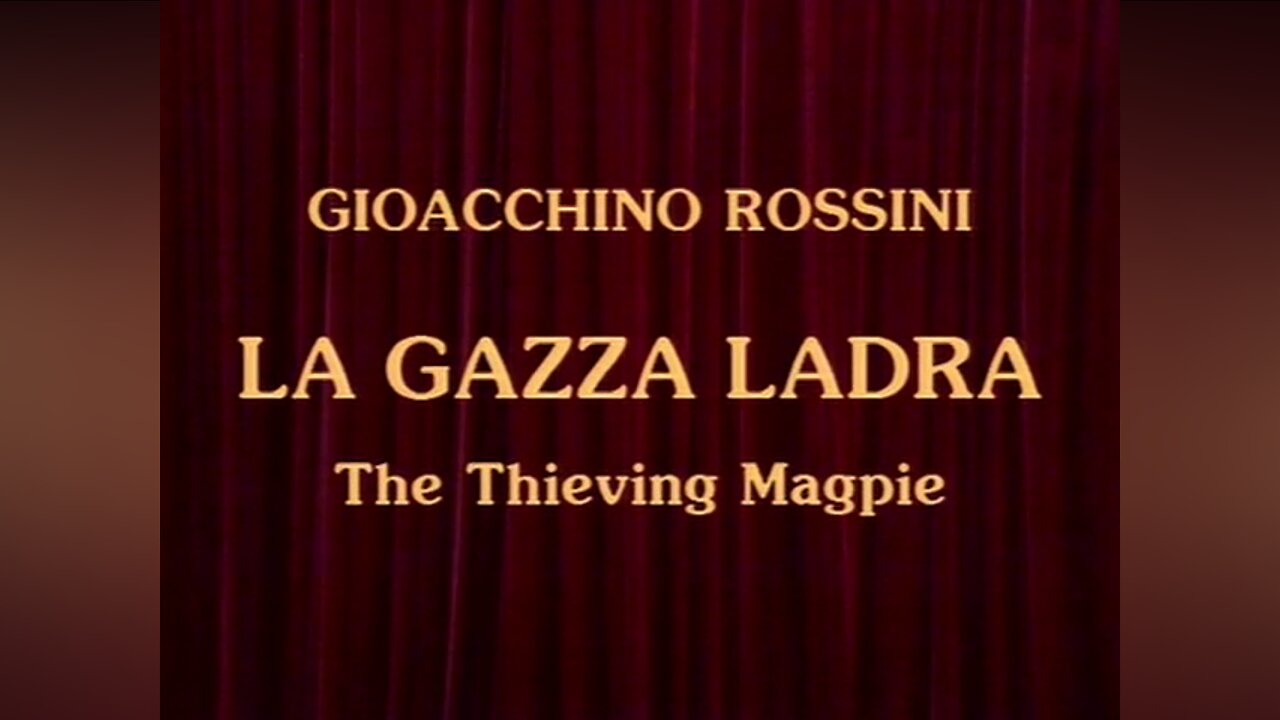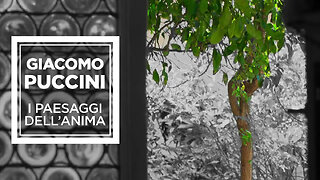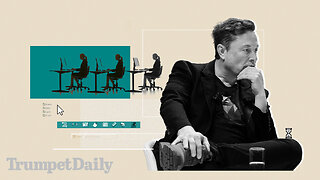Premium Only Content

Rossini - La Gazza ladra | Cotrubas, Feller, Condo, Kuebler, Bartoletti (Cologne Opera 1987)
Composer: Giaochino Rossini
Librettist: Giovanni Gherardini
Premiere: 31 May 1817, La Scala, Milan
Language: Italian
Subtitles: English
Synopsis: https://www.opera-arias.com/rossini/la-gazza-ladra/synopsis/
Opera semiseria in two acts
Chorus of the Cologne Opera
Gürzenich Orchestra Cologne
Conductor Bruno Bartoletti
Live recording from the Cologne Opera 1987
Cast & Characters;
Fabrizio - Carlos Feller
Lucia - Nucci Condo
Giannetto - David Kuebler
Ninetta - Ileana Cotrubas
Fernando - Brent Ellis
Il Podesta' - Alberto Rinaldi
Pippo - Elena Zilio
Isacco - Erlingur Vigfusson
Antonio - Eberhard Katz
La gazza ladra (The Thieving Magpie) is a melodramma or opera semiseria in two acts by Gioachino Rossini, with a libretto by Giovanni Gherardini based on La pie voleuse by Théodore Baudouin d'Aubigny and Louis-Charles Caigniez. The Thieving Magpie is best known for the overture, which is musically notable for its use of snare drums. This memorable section in Rossini's overture evokes the image of the opera's main subject: a devilishly clever, thieving magpie.
Rossini wrote quickly, and La gazza ladra was no exception. A 19th-century biography quotes him as saying that the conductor of the premiere performance locked him in a room at the top of La Scala the day before the premiere with orders to complete the opera's still unfinished overture. He was under the guard of four stagehands whose job it was to toss each completed page out the window to the copyist below.
An animated short film called La gazza ladra was made in 1964 by Giulio Gianini and Emanuele Luzzati using the overture as the soundtrack, with motion synchronized to the music. It was constructed by moving cutouts from frame to frame to illustrate a story of a thieving magpie, centered on the magpie, unlike in the opera. In 1965 the film was nominated for an Academy Award and won the first Grand Prix of the Melbourne International Film Festival.
Stanley Kubrick used the overture for the early scenes of his movie A Clockwork Orange. The music gives the viewer a voyeuristic insight into the exhilaration that the sociopathic narrator Alex obtains from a typical night out with his friends performing acts of violence and mayhem while mindless of the horrific consequences for his victims.
-
 1:00:18
1:00:18
Adaneth - Arts & Literature
18 days agoGiacomo Puccini: I paesaggi dell'anima
32 -
 4:51:08
4:51:08
Wahzdee
10 hours agoSniper Elite Then Extraction Games—No Rage Challenge! 🎮🔥 - Tuesday Solos
64.5K3 -
 2:12:58
2:12:58
Robert Gouveia
9 hours agoSenator's Wife EXPOSED! Special Counsel ATTACKS; AP News BLOWN OUT
72.8K58 -
 55:07
55:07
LFA TV
1 day agoDefending the Indefensible | TRUMPET DAILY 2.25.25 7PM
47.7K19 -
 6:09:26
6:09:26
Barry Cunningham
16 hours agoTRUMP DAILY BRIEFING - WATCH WHITE HOUSE PRESS CONFERENCE LIVE! EXECUTIVE ORDERS AND MORE!
86K50 -
 1:46:37
1:46:37
Game On!
10 hours ago $0.51 earnedPUMP THE BRAKES! Checking Today's Sports Betting Lines!
51.6K4 -
 1:27:21
1:27:21
Redacted News
10 hours agoBREAKING! SOMETHING BIG IS HAPPENING AT THE CIA AND FBI RIGHT NOW, AS KASH PATEL CLEANS HOUSE
222K268 -
 1:08:28
1:08:28
In The Litter Box w/ Jewels & Catturd
1 day agoCrenshaw Threatens Tucker | In the Litter Box w/ Jewels & Catturd – Ep. 749 – 2/25/2025
116K64 -
 44:57
44:57
Standpoint with Gabe Groisman
1 day agoWill Byron Donalds Run for Florida Governor? With Congressman Byron Donalds
69.5K9 -
 1:06:25
1:06:25
Savanah Hernandez
9 hours agoEXPOSED: FBI destroys evidence as NSA’s LGBTQ sex chats get leaked?!
89.6K30